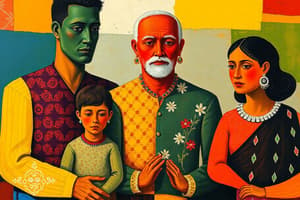Podcast
Questions and Answers
In the simple present tense, what is the unique feature of the verb 'to be'?
In the simple present tense, what is the unique feature of the verb 'to be'?
- It has a unique form for each person (correct)
- It follows the same pattern as other verbs
- It's not used to describe habits and routines
- It doesn't take an -s or -es ending in the third person singular
What type of sentences are used to describe planned or scheduled events?
What type of sentences are used to describe planned or scheduled events?
- Scheduled events (correct)
- Timeless situations
- General truths
- Habits and routines
What kind of time expressions can be used with the simple present tense?
What kind of time expressions can be used with the simple present tense?
- Yesterday, last week, last year
- Next week, next month, next year
- Morning, afternoon, evening
- Always, usually, often, sometimes (correct)
What is the purpose of using the simple present tense with general truths?
What is the purpose of using the simple present tense with general truths?
What kind of sentences are used to describe regular or habitual actions?
What kind of sentences are used to describe regular or habitual actions?
Study Notes
Immediate Family Members
- Spouse: A person's husband or wife
- Children: Biological or adopted sons and daughters
- Parents: Biological or adoptive mother and father
- Siblings: Biological or adopted brothers and sisters
Extended Family Members
- Grandparents: Parents of a person's parents
- Grandchildren: Children of a person's children
- Aunts and Uncles: Siblings of a person's parents
- Nieces and Nephews: Children of a person's siblings
- Cousins: Children of a person's aunts and uncles
Other Family Members
- In-laws: Relatives of a person's spouse
- Mother-in-law: Mother of a person's spouse
- Father-in-law: Father of a person's spouse
- Brother-in-law: Brother of a person's spouse
- Sister-in-law: Sister of a person's spouse
- Stepparents: Spouse of a person's parent
- Step-siblings: Children of a person's stepparent
- Foster family: A family that provides care and support to a child or adult who is not their biological or adoptive relative
Family Relationships
- Immediate family members include spouse, children, parents, and siblings, all of whom can be biological or adopted.
Immediate Family Roles
- Spouse refers to a person's husband or wife.
- Children include biological and adopted sons and daughters.
- Parents include biological and adoptive mother and father.
- Siblings include biological and adopted brothers and sisters.
Extended Family Relationships
- Grandparents are the parents of a person's parents.
- Grandchildren are the children of a person's children.
- Aunts and uncles are the siblings of a person's parents.
- Nieces and nephews are the children of a person's siblings.
- Cousins are the children of a person's aunts and uncles.
Other Family Relationships
- In-laws are relatives of a person's spouse, including mother-in-law, father-in-law, brother-in-law, and sister-in-law.
- Stepparents are the spouse of a person's parent.
- Step-siblings are the children of a person's stepparent.
- Foster family provides care and support to a person who is not their biological or adoptive relative.
Formation of Simple Present Tense
- Base form of the verb is used (except for "to be")
- Third person singular (he, she, it) takes an -s or -es ending
- Unique forms for each person in the verb "to be" (I am, you are, he/she/it is, we are, they are)
Uses of Simple Present Tense
Habits and Routines
- Describes regular or habitual actions
- Examples: I wake up at 7:00 am every day, She eats breakfast at 8:00 am
General Truths
- States facts or universal truths
- Examples: The sun rises in the east, Water boils at 100°C
Timeless Situations
- Describes situations that are always true
- Examples: I love playing tennis, London is the capital of England
Scheduled Events
- Talks about planned or scheduled events
- Examples: The bus arrives at 8:00 am, The meeting starts at 2:00 pm
Time Expressions
- Used with time expressions such as:
- always, usually, often, sometimes, rarely, never
- every day, week, month, year
- at the moment, nowadays, currently
Sentence Types
Positive Sentences
- Examples: I live in Paris, She works as a teacher
Negative Sentences
- Examples: I don't like coffee, They don't speak English
Interrogative Sentences
- Examples: Do you speak French?, What do you do for a living?
Studying That Suits You
Use AI to generate personalized quizzes and flashcards to suit your learning preferences.
Description
Identify the different types of immediate and extended family members, including spouses, children, parents, siblings, and more. Learn the relationships between them and how they are connected.




